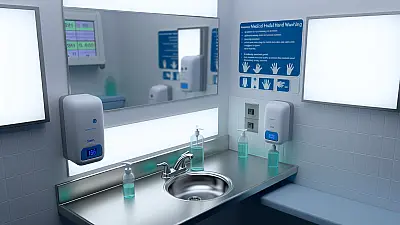MIAMI, FL - Federal inspectors cited University Plaza Rehabilitation and Nursing Center for failing to properly monitor and address ongoing quality issues through its required Quality Assurance and Performance Improvement program during a May 22, 2025 inspection.

Quality Oversight System Falls Short of Federal Standards
The facility received a citation under regulation F867, which governs Quality Assurance and Performance Improvement (QAPI) programs. These federally mandated systems serve as the backbone of nursing home quality control, requiring facilities to continuously monitor care delivery, identify problems, and implement systematic improvements.
According to the inspection report, the facility's QAPI committee failed to adequately monitor previous problem areas that had been identified as needing improvement. This represents a breakdown in the continuous quality improvement cycle that nursing homes must maintain to ensure resident safety and care quality.
The QAPI committee at University Plaza meets monthly on the fourth Thursday of each month, with the most recent meeting documented as April 24, 2025. The committee includes key leadership positions: the Medical Director, Administrator, Director of Nursing, Infection Preventionist, Registered Dietitian, Maintenance Director, Activities Director, Social Services Director, and other department heads.
Critical Gap in Performance Monitoring
The violation specifically targeted the committee's failure to continue monitoring areas previously identified as problematic. This represents a significant oversight in quality management, as effective QAPI programs require sustained attention to problem areas until they demonstrate consistent improvement.
Each department within the facility is assigned specific objectives and focus areas to monitor and report on monthly. During QAPI meetings, representatives from nursing, social services, environmental services, and other departments are expected to present data and discuss trends. These collaborative sessions are designed to identify emerging concerns and develop improvement strategies.
However, the inspection found that the committee was not maintaining adequate oversight of previously identified issues, suggesting a breakdown in the follow-through process that is essential for meaningful quality improvement.
Medical Significance of Quality Assurance Failures
QAPI programs serve as early warning systems for nursing homes, helping identify patterns that could lead to serious resident harm if left unaddressed. When these systems fail to monitor known problem areas, facilities lose the ability to prevent recurring issues that could compromise resident care.
Effective quality assurance programs help facilities identify trends in areas such as medication errors, falls, infections, pressure ulcers, and other adverse events. Without proper monitoring and follow-up, these issues can escalate, potentially leading to preventable hospitalizations, extended recovery times, or other serious health consequences for vulnerable nursing home residents.
The collaborative nature of QAPI committees ensures that quality issues are addressed from multiple perspectives, with input from clinical, administrative, and support staff. When this system breaks down, facilities may miss critical opportunities to improve care delivery and prevent adverse outcomes.
Industry Standards and Federal Requirements
Federal regulations require nursing homes to maintain robust QAPI programs that continuously assess and improve all aspects of care and services. These programs must systematically examine outcomes, identify opportunities for improvement, and implement changes to enhance resident quality of life and care outcomes.
The regulations specify that QAPI programs should focus on high-risk, high-volume, or problem-prone areas, and must include ongoing monitoring to ensure that implemented improvements are sustained over time. Facilities are expected to use data-driven approaches to identify trends and implement evidence-based interventions.
Proper QAPI implementation requires regular committee meetings, comprehensive data collection and analysis, development of improvement plans for identified issues, and ongoing monitoring to verify that improvements are maintained. The program should create a culture of continuous improvement throughout the facility.
Regulatory Response and Facility Operations
The citation under F867 indicates that federal inspectors found the facility's quality assurance efforts insufficient to meet regulatory standards. This type of violation requires facilities to develop corrective action plans demonstrating how they will strengthen their quality monitoring processes.
Effective remediation typically involves reviewing committee structure and membership, enhancing data collection and analysis capabilities, improving follow-up procedures for identified issues, and strengthening accountability measures for sustained improvement efforts.
The facility's QAPI committee structure appears comprehensive, including representation from key departments necessary for effective quality oversight. However, the citation suggests that the process for maintaining focus on previously identified problems requires strengthening to ensure continuous improvement efforts are sustained until issues are fully resolved.
Full Inspection Report
The details above represent a summary of key findings. View the complete inspection report for University Plaza Rehabilitation and Nursing Center from 2025-05-22 including all violations, facility responses, and corrective action plans.
💬 Join the Discussion
Comments are moderated. Please keep discussions respectful and relevant to nursing home care quality.